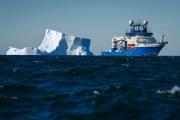It’s been 100 years since people discovered the existence of the colossal squid, known by its scientific name Mesonychoteuthis hamiltoni, when a scientist found pieces of two huge squids in a sperm whale’s stomach. Although several (mostly dead) specimens have been collected since then—including one weighing over 1,000 pounds in 2007—scientists have never managed to film one of these creatures in its natural habitat. That changed this year when researchers captured video of a baby colossal squid near the South Sandwich Islands in the South Atlantic Ocean.
In Print: May 1, 2025





